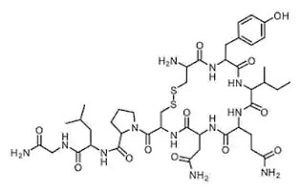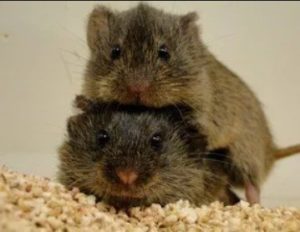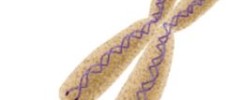What hormone causes you to feel love, empathy, compassion, and trust, makes you feel bonded to your loved ones (including pets), reduces feelings of fear and stress, increases honesty, causes women to deliver babies, and causes men and women to have orgasms?
This hormone is the main reason why animals, like humans live in cooperative groups. Body language, compassion, social recognition, and emotional connections are essential for survival in social animals. It also happens to help us live longer, and….this hormone makes us feel really good!!
This hormone is oxytocin

We often separate our cognitive/thinking brain functions from our emotional/feeling brain functions but feelings are as physiological as thinking, regulating body temperature, or digesting food. We feel things because of the levels and combinations of hormones and neurotransmitters produced by our brain and endocrine system. When we have higher levels of hormones like oxytocin and serotonin then we feel good.
Oxytocin is produced in a part of the brain called the hypothalamus; it is then transported to the posterior pituitary gland where it stored until it is released. When oxytocin is released, it binds to many cells in the body including other brain cells. Low levels of oxytocin makes us feel lonely, isolated, anxious, disconnected/ detached, and contributes significantly to depression.
Oxytocin makes us feel great, so how can we make sure our brain is producing enough it?
But first, a little love story….

There is a species of prairie vole that forms tight monogamous relationships. They groom each other extensively, nest together, and have no interest in meeting other voles once they have found “the one”. There is a very closely related vole species that shares more than 99% of the same DNA yet this other species is the one-night stand type and has no interest in forming a single long-lasting relationship. Only a handful of genes are different in these voles and one of them affects the release of oxytocin. If scientists block the release of oxytocin in the monogamous voles, they become like their philandering cousins; likewise, if they inject oxytocin into the one-night stand voles, they form monogamous relationships.
Are humans meant to be monogamous? All monogamous species make oxytocin, but not all species that produce oxytocin are monogamous; scientists are still not sure about humans so I will let you decide for yourself.
Regardless of monogamy, humans benefit in many ways from producing oxytocin. Levels vary between people for reasons that are not all known yet. It is an evolutionary survival benefit to live in groups and share skills, to protect and care about each other and our children, to have morality, honesty, empathy, and trust; oxytocin is what makes all of that possible. It is an added bonus that it makes us feel so great!
Fun Fact: Psychopaths, sociopaths, and people with severe autism produce significantly less oxytocin or have alterations in their oxytocin receptors compared to other humans.
MDMA (methylenedioxymethamphetamine), also known as Ecstasy, or the ‘love drug’ is a drug that stimulates the release of a few different molecules including oxytocin. Recently, MDMA in very low doses has been used to enhance psychotherapy, to help people with personality disorders, autism, and schizophrenia. The treatment causes patients to feel friendlier, more trusting, more empathy, and better able to connect with people. MDMA also stimulates the release of dopamine, serotonin, and norepinephrine, so some other effects include feelings of alertness (dopamine) and anxiety (norepinephrine) can occur.
How can we increase oxytocin production naturally?
Besides delivering a baby or breast feeding…
- Touch – physically touching another human, hugging, cuddling, kissing, any form of touch will cause the release of oxytocin; touch doesn’t have to be sexual, although that does cause a lot of oxytocin to be released. You can hug your pet! Ideally a mammal is best because fish and reptiles don’t make much oxytocin. Birds make oxytocin but they are hard to hug.
Many mammals that produce large amounts of oxytocin will die as babies if they are not touched; the most well-known example is elephants but this will occur in many other species as well. In humans, babies that lack physical touch have delayed physical development as well as a stronger/maladapted stress response, increased anxiety, and higher incidence of mental health disorders as adults.
- Meaningful communication – simply physically being around other people and having meaningful conversation. Being around people you don’t like or don’t feel connected to will not stimulate oxytocin production and can actually increase feelings of anxiety and loneliness….it is becoming more common to feel ‘alone in a crowd’ because of reduced numbers of meaningful relationships. It is important to maintain relationships with people in person and not just through social media. Some experts believe there is a link between the massive increase in depression in the last 20 years and the decrease in in-person relationships.
- Helping someone – even if it is something as simple as giving a busker a couple bucks, or helping an old lady cross the street, giving and helping others makes us feel good. It is why so many people love to give gifts; it feels good to give because you make oxytocin.
- Mutual eye contact – If a gaze lingers, there is oxytocin (and maybe attraction). There have been studies that show that looking into someone’s eyes for 1 full minute without talking will increase feelings of connectedness and love. And it works with dogs! You and your dog will both make oxytocin when you look into each others eyes (this doesn’t work as well with cats… or birds).
Fun Fact – Dogs make more oxytocin than cats, technically, your dog loves you 5X more than your cat. Dogs have evolved as companions to humans longer than any other domesticated animal species. Dogs that could bond with humans were more likely to survive. I believe it is why dogs today have such amazing abilities to read human body language. We have been evolving together for over 15,000 years; which is why we can form very strong bonds with dogs.

- Estrogen increases the secretion of oxytocin, which is why women are more receptive to men at certain times of their menstrual cycle. More estrogen is produced over the first half of the cycle when the egg is developing and then ovulated; this is an obvious evolutionary benefit to have increased sexual desire when eggs are available for fertilization. We don’t have much control over estrogen production though.
- Vitamin C is an integral key component required for enzyme system involved in the production and activation of oxytocin. Oxytocin receptor function requires magnesium and cholesterol.
Oxytocin and addiction
Some people have habits that simulate a relationship, the most common being smoking and alcohol, but I would argue that over-eating falls into this category as well. Often people that quit smoking or drinking feel like they have lost a friend. Research shows targeting the oxytocin system in the brain is a potential target for treating addiction. In fact, one study showed that male rats that were addicted to cocaine, pushed the cocaine lever much less when placed in a cage with a female rat. But, if they were partnered up with another male rat that caused fighting and stress then the rats chose cocaine over food. A nice rat friend was better than cocaine, huh.
Last cool thing about oxytocin, it directly reduces the production of cortisol, the stress hormone that can wreck havoc on our body and cause all kinds of health problems and disease. This is why therapy animals are becoming popular in many settings.
Bottom line, healthy social interactions are extremely important for our physical and mental well-being. And if you don’t have enough cool people in your life, then get a dog 🙂
References
The orgasmic history of oxytocin
Effects of MDMA and intranasal oxytocin on social and emotional processing
The Role of Oxytocin in Antisocial Personality Disorders: A Systematic Review of the Literature
Sapiens: A brief history of humankind – this book talks about how dogs and humans evolved together in chapter 3
Life in groups: the roles of oxytocin in mammalian sociality
Oxytocin-gaze positive loop and the coevolution of human-dog bonds


Awesome article Dr.W! Obviously, Dex has no problem with the “love hormone” — he can stare for hours!
Yes, Dex is an awesome dog! 😀